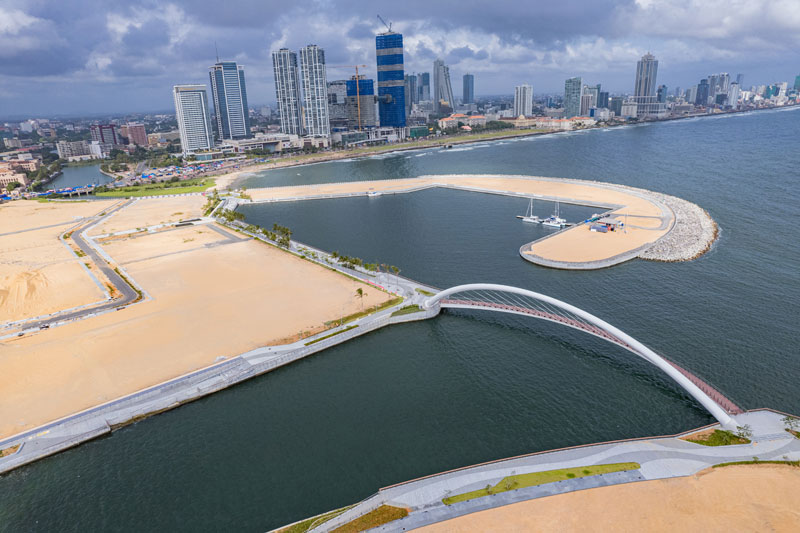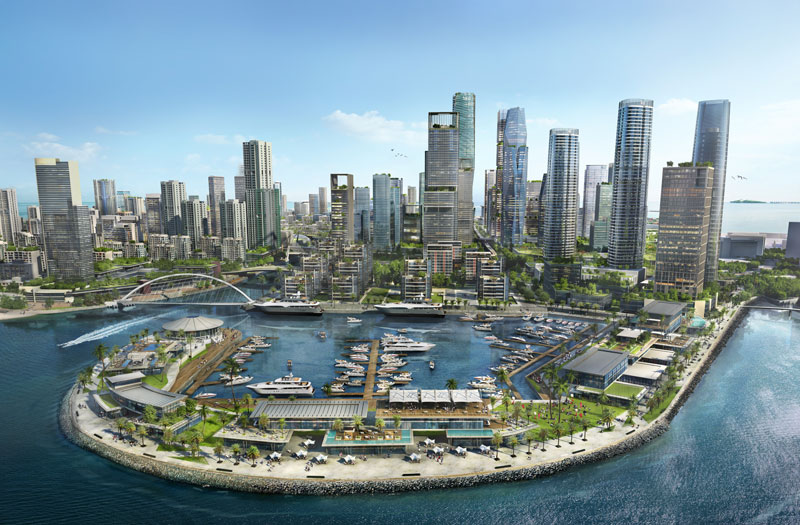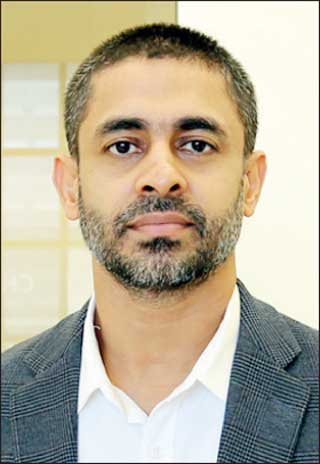Sunday Feb 15, 2026
Sunday Feb 15, 2026
Wednesday, 22 June 2022 00:24 - - {{hitsCtrl.values.hits}}


By Darshana Abayasingha
 |
| CHEC Port City Colombo Deputy Managing Director Thulci Aluwihare
|
The Port City Colombo will feature prominently at the year’s Commonwealth Heads of Government Meeting taking place in Rwanda this week.
This is the project’s first international forum since completion of land reclamation in January 2019, and the Port City
Economic Commission Act that was passed in May last yea. 54 member countries in the Commonwealth will participate at the forum, whilst the 36 other nations too will be present at the event in Kigali, Rwanda.
The Project Company is also a Strategic Partner to the Commonwealth Enterprise and Investment Committee, whereby it receives a dedicated slot as a knowledge partner for the Commonwealth Business Forum.
Speaking to the Daily FT, CHEC Port City Colombo Deputy Managing Director Thulci Aluwihare said: “This is a long-term project, so yes whilst there is a downturn waiting is not going to solve that problem.
“We feel by engaging and having one-on-one discussions with potential interested parties, which consists of governments and potential investors, we could iron out much of the misconceptions that exist in the Port City. Through these discussions we hope to really understand what their issues or pain points are and see how we can address it.”
“Port City is governed by a special economic zone law, whereby the larger macro-economic issues of Sri Lanka will not have any significant bearing on it, as it is a ring-fenced Special Economic Zone. For instance, the law says for you to do any business in Port City the capital must be raised outside in foreign currency. We are not looking to tap any funds from Sri Lanka.
“So, domestic inflation and interest rates don’t apply here. The law also says for any business that is set up; 100% of revenues must come from outside, so we are not dependent on local demand. Because we have the Special Economic Zone law, and the ability of the Commission to draft new regulations, we can understand and address any issues that demonstrate to international investors that this is an economically ringfenced zone,” Aluwihare said.
Growth catalyst
The Deputy Managing Director for the Project said Sri Lanka will take considerable time to rebound economically, but the Port City could well be the catalyst to drive foreign direct investment into the country to kickstart the revival, should they succeed in winning investor confidence. He reiterated the Port City is a ring fenced Special Economic Zone and underscored investors could bring in their funds and transact outside of the restrictions that are applicable now in the country.
The Port City project has attracted investments for about 4.5 hectares of its entirety last year, which includes a $ 500 million investment that is billed to get underway before the end of the year. Aluwihare revealed the Project’s Managers are sticking to the timelines and plans it had originally drawn out, on the back of a roadshow done in the UK, Singapore and Dubai.
In August this year, Port City Colombo will feature at the World City Summit in Singapore, which attracts city administrators, planners and investors from around the world. Aluwihare noted it was crucial to build awareness, as Sri Lanka is widely reputed as a tourist destination and not known for business. This is why a very progressive Special Economic Zone law with competitive business-friendly regulation is needed, he said.
Regulations to fit
“We need to ensure regulations suit the purpose given where the country is now. We will have to differentiate or throw in some sweeteners to attract investment. The 40-year tax holiday is one of them. We are not the only destination for investment.
“After COVID, there is huge competition to attract capital including human capital. This is why Dubai is offering 10-year resident visas, and why Singapore is offering a ten-year tech pass. We need to find answers to the question why anyone would come and invest in Sri Lanka.”
“One of them is that we throw in certain amounts of tax concessions to offset the risk you take by investing in this country. The reward should coincide with the risk you are willing to take. Now if this was like Singapore, where we rank in the top three on the Ease of Doing Business index then you don’t have to do any of these. But here we rank at about 100,” Aluwihare noted.
The Port City law and the Commission have been given sufficient powers, and the only missing pieces are regulations. There is opportunity to target the regulations to meet the specific criteria for improving ease of doing business, which include ten verticals such as starting a business, construction permits, obtaining electricity, access to credit, etc. How can Sri Lanka match that in Singapore?
This would require digitised systems and one-stop-shops to address investor needs, and Aluwihare stressed the importance of cooperation from the Ministry of Finance and the highest level of government to ensure their success. He also noted that there can be no tax erosion or leakage from Sri Lanka due to the project, as the Port City was built entirely with Foreign Direct Investment and not used tax-payers money.
A South Asia wonder
“Our vision is to build a world class city for South Asia. India is our primary market in South Asia. In East Asia there is Singapore, Malaysia, China and then there is the Middle East. These are our primary markets for development or developers. We are scoping the entire globe for businesses to come set up. We need to go beyond the conventional method, because we are not Dubai. We are yet to be proven.
“So, we are trying to first appeal to secondary investors; the multinational companies and ask would you come and set up here? If we are able to get commitment from businesses they will come and set up here, using that commitment it becomes easier for us to go to primary developers who could come make infrastructure investments. Otherwise, there is a larger risk for people to develop and expect businesses to flow through,” he explained.
Aluwihare expressed hope that with the potential advent of global multinationals to Sri Lanka, who could well set up regional offices in the Port City, Sri Lankan talent would opt to work for these multinationals from here at home. The SEZ law states that employees must be paid in dollars, so there is great opportunity and scope through this project to people and local industries, he explained.
There could be great potential for local supply chains as Sri Lankan companies and individuals of all sizes and walks could provide goods and services, which in essence serve as an export and be paid in foreign currency. That impact will definitely flow outside Port City.
“Whatever we did over the past 70 years did not work for us. We have to agree on that. So, we need a paradigm shift in our thinking and policies. So, why not the government and the Commission try some of those policies in this Special Economic Zone, because it’s a ringfenced controlled environment.
“Try them out and then perhaps you could roll it out to the centre. Because the Port City Act can go beyond the geography of the Port City. The President or the minister in charge can demarcate areas similar to that of BOI industrial zones, and say Colombo 1 can come under the Port City. Ideally, we should become another Singapore,” he averred.